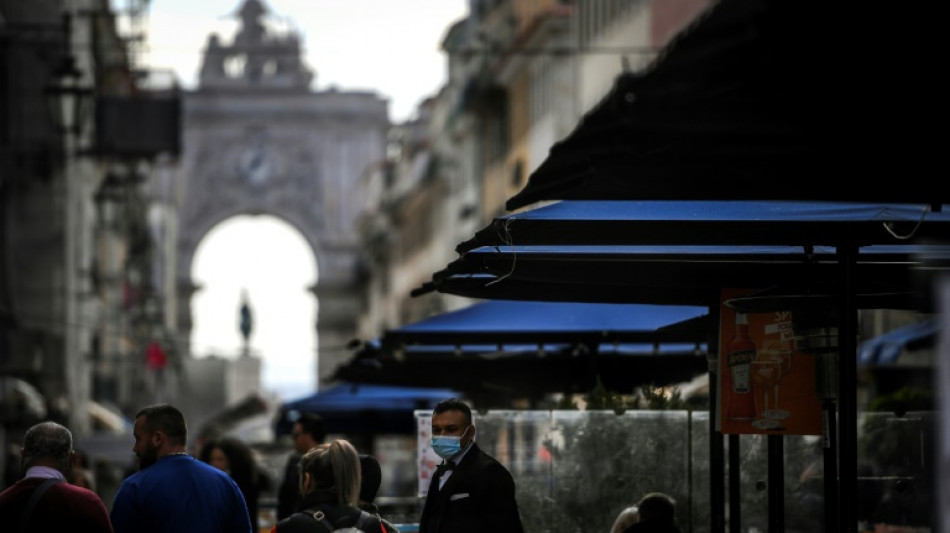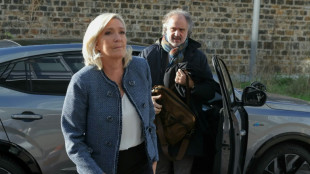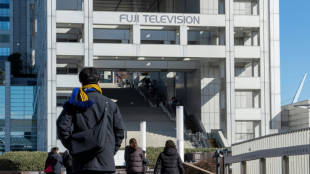
-
 French court hands Le Pen five-year election ban
French court hands Le Pen five-year election ban
-
Probe accuses ex J-pop star Nakai of sexual assault

-
 Japan leads hefty global stock market losses on tariff woes
Japan leads hefty global stock market losses on tariff woes
-
Saka 'ready to go' after long injury lay-off: Arteta

-
 Ingebrigtsen Sr, on trial for abusing Olympic champion, says he was 'overly protective'
Ingebrigtsen Sr, on trial for abusing Olympic champion, says he was 'overly protective'
-
Tourists and locals enjoy 'ephemeral' Tokyo cherry blossoms

-
 Khamenei warns of 'strong' response if Iran attacked
Khamenei warns of 'strong' response if Iran attacked
-
France fines Apple 150 million euros over privacy feature

-
 UK PM urges nations to smash migrant smuggling gangs 'once and for all'
UK PM urges nations to smash migrant smuggling gangs 'once and for all'
-
Thai authorities probe collapse at quake-hit construction site

-
 France's Le Pen convicted in fake jobs trial
France's Le Pen convicted in fake jobs trial
-
Chinese tech giant Huawei says profits fell 28% last year

-
 Trump says confident of TikTok deal before deadline
Trump says confident of TikTok deal before deadline
-
Myanmar declares week of mourning as hopes fade for quake survivors

-
 Japan's Nikkei leads hefty market losses, gold hits record
Japan's Nikkei leads hefty market losses, gold hits record
-
Tears in Taiwan for relatives hit by Myanmar quake

-
 Venezuela says US revoked transnational oil, gas company licenses
Venezuela says US revoked transnational oil, gas company licenses
-
'Devastated': Relatives await news from Bangkok building collapse

-
 Arsenal, Tottenham to play pre-season North London derby in Hong Kong
Arsenal, Tottenham to play pre-season North London derby in Hong Kong
-
Japan's Nikkei leads hefty equity market losses; gold hits record

-
 Israel's Netanyahu picks new security chief, defying legal challenge
Israel's Netanyahu picks new security chief, defying legal challenge
-
Trump says US tariffs to hit 'all countries'

-
 Prayers and tears for Eid in quake-hit Mandalay
Prayers and tears for Eid in quake-hit Mandalay
-
After flops, movie industry targets fresh start at CinemaCon

-
 Tsunoda targets podium finish in Japan after 'unreal' Red Bull move
Tsunoda targets podium finish in Japan after 'unreal' Red Bull move
-
French chefs await new Michelin guide

-
 UK imposes travel permit on Europeans from Wednesday
UK imposes travel permit on Europeans from Wednesday
-
At his academy, Romanian legend Hagi shapes future champions

-
 Referee's lunch break saved Miami winner Mensik from early exit
Referee's lunch break saved Miami winner Mensik from early exit
-
Djokovic refuses to discuss eye ailment after shock Miami loss

-
 Mitchell magic as Cavs bag 60th win, Pistons and T'Wolves brawl
Mitchell magic as Cavs bag 60th win, Pistons and T'Wolves brawl
-
Mensik shocks Djokovic to win Miami Open

-
 Duterte lawyer: 'compelling' grounds to throw case out
Duterte lawyer: 'compelling' grounds to throw case out
-
What happens on Trump's 'Liberation Day' and beyond?

-
 Clock ticks on Trump's reciprocal tariffs as countries seek reprieve
Clock ticks on Trump's reciprocal tariffs as countries seek reprieve
-
Japan-Australia flagship hydrogen project stumbles

-
 Musk deploys wealth in bid to swing Wisconsin court vote
Musk deploys wealth in bid to swing Wisconsin court vote
-
Mensik upsets Djokovic to win Miami Open

-
 China manufacturing activity grows at highest rate in a year
China manufacturing activity grows at highest rate in a year
-
'Waited for death': Ex-detainees recount horrors of Sudan's RSF prisons

-
 Japan's Nikkei leads big losses in Asian markets as gold hits record
Japan's Nikkei leads big losses in Asian markets as gold hits record
-
Rescue hopes fading three days after deadly Myanmar quake

-
 'Basketbrawl' as seven ejected in Pistons-Wolves clash
'Basketbrawl' as seven ejected in Pistons-Wolves clash
-
Four men loom large in Microsoft history

-
 Computer pioneer Microsoft turns 50 in the age of AI
Computer pioneer Microsoft turns 50 in the age of AI
-
Trump calls out both Putin and Zelensky over ceasefire talks

-
 Kim Hyo-joo tops Vu in playoff to win LPGA Ford Championship
Kim Hyo-joo tops Vu in playoff to win LPGA Ford Championship
-
Economy and especially Trump: Canadians' thoughts on campaigns

-
 Liberal PM Carney takes lead four weeks before Canada vote
Liberal PM Carney takes lead four weeks before Canada vote
-
SpaceX to launch private astronauts on first crewed polar orbit


Minimum wage in focus as Portugal heads to polls
Like nearly one in four workers in Portugal, Fernanda Moreira, a food services worker at a hospital in a Lisbon suburb, earns the minimum wage.
"We don't live, we survive," said the 40-year-old mother of a 12-year-old boy whose husband earns just a bit more than her.
"We learn to live with the essentials. It is frustrating and sad."
Portugal's large and growing pool of workers like Moreira who earn the minimum wage -- and the incumbent Socialist party's plans to raise it further -- is a key issue in Sunday's snap election.
Nearly 900,000 workers in Portugal earn the minimum wage, which was raised this year by 47 euros to 822 euros ($927) per month, still one of the lowest in western Europe.
Their numbers have doubled over the past decade, according to a study by economist Eugenio Rosa, who warns Portugal "is becoming a nation of minimum wages."
Prime Minister Antonio Costa has vowed to raise the minimum wage above 1,000 euros a month by 2026 if he is re-elected. It stood at 589 euros when he took office in 2015.
"It is even possible to go beyond that," Costa said Monday during a radio interview.
But the two hard-left parties that have propped up his minority government have slammed the proposed increase as too little while the main opposition centre-right PSD party argues it goes too far.
- 'Miserable wages' -
The Communist party voted against Costa's proposed 2022 budget, prompting the early election, in part because it deemed this year's minimum wage hike too small.
The PSD argues minimum wage increases should track growth in productivity and the economy.
PSD leader Rui Rio points out that Portugal's GDP per capita has increased by an annual average of just 0.3 percent between 2001 and 2020, less than half the EU growth rate.
Rio, an economist by training, says the government should focus instead on raising the medium wage since qualified graduates are being forced to choose between "miserable wages" at home and emigration.
While the minimum wage has steadily risen, the medium wage has stagnated at 1,160 euros per month, reducing the gap between the two.
"Companies have raised their minimum wages because they were forced to by law, but they left other salaries untouched," said Joao Duque, an economist at Lisbon's School of Economics and Management (ISEG).
The government's strategy to achieve full employment has led to the development of an economy based on low wages centred on sectors like tourism and construction, he added.
This has "encouraged the emigration of more qualified workers to countries where they are paid better, and the immigration of less qualified workers," Duque said.
- 'Not our recipe' -
Portugal's unemployment rate fell to around six percent last year, its lowest level in two decades -- a figure highlighted by the Socialists throughout the campaign.
Labour Minister Ana Mendes Godinho said the "significant" rise in the minimum wage has boosted economic growth.
"Austerity advocates claimed that freezing wages is the only way to become a competitive country. It's not our recipe," she told AFP.
The policy is popular with many low-wage voters ahead of Sunday's early election, with some polls suggesting the Socialists and the PSD are virtually tied.
"We have never seen such a significant increase in the minimum wage," said Amelia Casquinha Fernandes, 60, who earns the minimum wage as a cleaner at Lisbon airport.
She said she was pleased that the Socialists had "kept their promise".
The debate comes as EU member states in December agreed on measures to better protect wage levels in Europe and give workers more power to oppose low pay.
National pay systems and minimum wages vary widely, from 332 euros a month in Bulgaria to just over 2,200 euros in Luxembourg, according to EU data.
D.Kaufman--AMWN